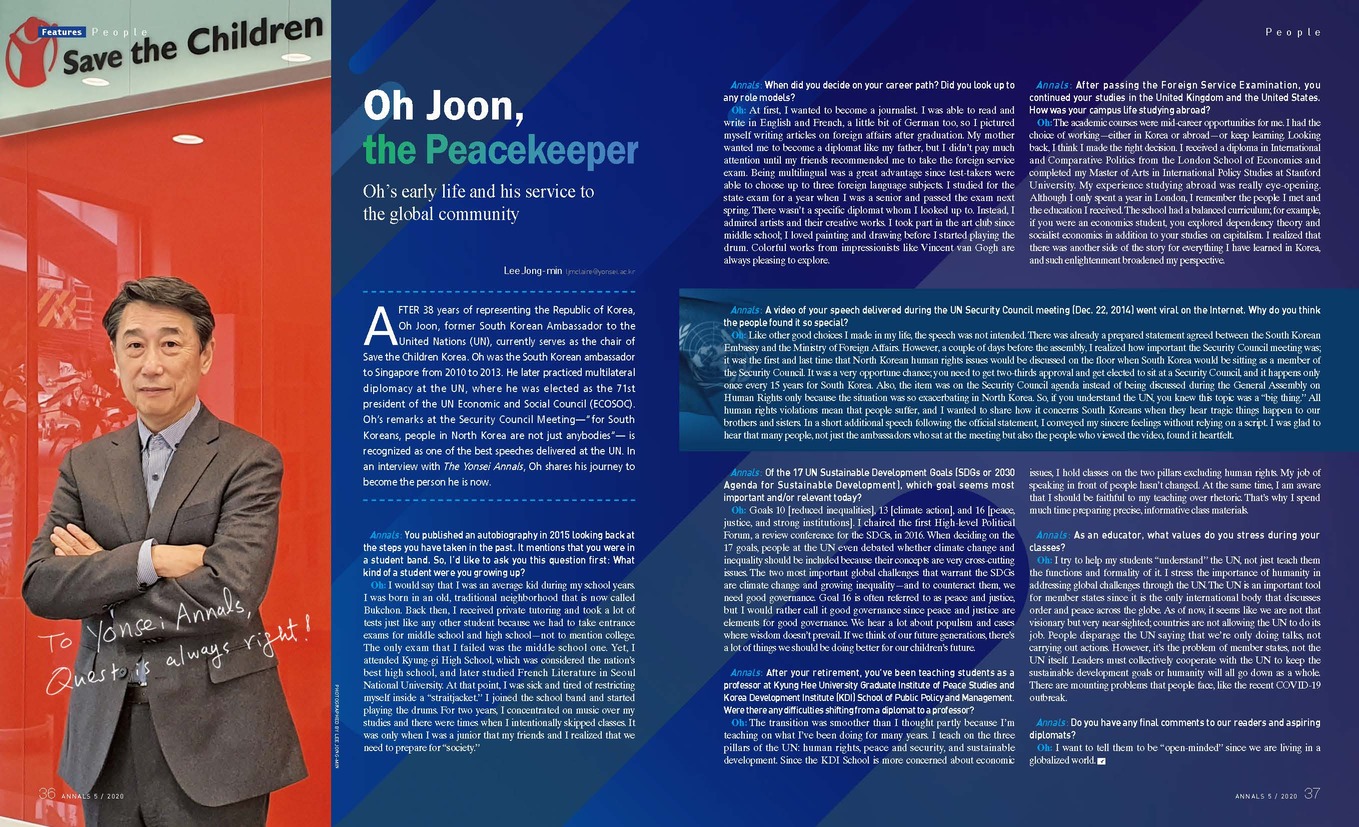Oh’s early life and his service to the global community

AFTER 38 years of representing the Republic of Korea, Oh Joon, former South Korean Ambassador to the United Nations (UN), currently serves as the chair of Save the Children Korea. Oh was the South Korean ambassador to Singapore from 2010 to 2013. He later practiced multilateral diplomacy at the UN, where he was elected as the 71st president of the UN Economic and Social Council (ECOSOC). Oh’s remarks at the Security Council Meeting—“for South Koreans, people in North Korea are not just anybodies”— is recognized as one of the best speeches delivered at the UN. In an interview with The Yonsei Annals, Oh shares the journey to become the person he is now.
Annals: You published an autobiography in 2015 looking back at the steps you have taken in the past. It mentions that you were in a student band. So, I'd like to ask you this question first: What kind of a student were you growing up?
Oh: I would say that I was an average kid during my school years. I was born in an old, traditional neighborhood that is now called Bukchon. Back then, I received private tutoring and took a lot of tests just like any other student because we had to take entrance exams for middle school and high school—not to mention college. The only exam that I failed was the middle school one. Yet, I attended Kyung-gi High School, which was considered the nation’s best high school, and later studied French Literature in Seoul National University. At that point, I was sick and tired of restricting myself inside a “straitjacket.” I joined the school band and started playing the drums. For two years, I concentrated on music over my studies and there were times when I intentionally skipped classes. It was only when I was a junior that my friends and I realized that we need to prepare for “society.”
Annals: When did you decide on your career path? Did you look up to any role models?
Oh: At first, I wanted to become a journalist. I was able to read and write in English and French, a little bit of German too, so I pictured myself writing articles on foreign affairs after graduation. My mother wanted me to become a diplomat like my father, but I didn’t pay much attention until my friends recommended me to take the foreign service exam. Being multilingual was a great advantage since test-takers were able to choose up to three foreign language subjects. I studied for the state exam for a year when I was a senior and passed the exam next spring. There wasn’t a specific diplomat whom I looked up to. Instead, I admired artists and their creative works. I took part in the art club since middle school; I loved painting and drawing before I started playing the drum. Colorful works from impressionists like Vincent van Gogh are always pleasing to explore.
Oh: The academic courses were mid-career opportunities to me. I had the choice of working—either in Korea or abroad—or keep learning. Looking back, I think I made the right decision. I received a diploma in International and Comparative Politics from the London School of Economics and completed my Master of Arts in International Policy Studies at Stanford University. My experience studying abroad was really eye-opening. Although I only spent a year in London, I remember the people I met and the education I received. The school had a balanced curriculum; for example, if you were an economics student, you explored dependency theory and socialist economics in addition to your studies on capitalism. I realized that there was another side of the story for everything I have learned in Korea, and such enlightenment broadened my perspective.
Oh: Like other good choices I made in my life, the speech was not intended. There was already a prepared statement agreed between the South Korean Embassy and the Ministry of Foreign Affairs. However, a couple of days before the assembly, I realized how important the Security Council meeting was; it was the first and last time that North Korean human rights issue would be discussed on the floor when South Korea would be sitting as a member of the Security Council. It was a very opportune chance; you need to get two-thirds approval and get elected to sit at a Security Council, and it happens only once every 15 years for South Korea. Also, the item was on the Security Council agenda instead of being discussed during the General Assembly on Human Rights only because the situation was so exacerbating in North Korea. So, if you understand the UN, you knew this topic was a “big thing.” All human rights violations mean that people suffer, and I wanted to share how it concerns South Koreans when they hear tragic things happen to our brothers and sisters. In a short additional speech following the official statement, I conveyed my sincere feelings without relying on a script. I was glad to hear that many people, not just the ambassadors who sat at the meeting but also the people who viewed the video, found it heartfelt.

